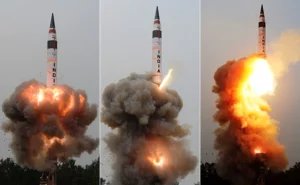
defencexp.com
What Is Agni-5 Missile?
The meaning of the Agni-5 missile ( Agni-V) is Fire. The Agni 5 missile is an Indian nuclear-capable intercontinental ballistic missile (ICBM). It is developed by Defence Research And Development Organization. The range of this missile is around 5000-8000 km. It is a three-stage, road-mobile, solid-fueled, intercontinental ballistic missile that is transported by truck and launched via a canister. Agni-5 missile is primarily for enhancing India’s nuclear deterrence against China. This missile is 1.75 meters tall and 2 meters in diameter. The weight of this missile is 1500 kg warhead and the speed of this missile is 24 Mach, 29,401 km/hour, 18,269mph, 8.1670 km/sec.
This Agni 5 missile is equipped with a laser ring gyro inertial navigation system. It can be used with satellite guidance. The missile can hit the target accurately and can be fired from a mobile launcher. After reaching the peak of its orbit, the missile is programmed to change direction towards the earth. It accelerates by earth gravitational force and continues travelling to its target- Board Computer and inertial navigation system. When a missile enters the earth atmosphere, rubbing the outer skin of the atmosphere raises its temperature above 4000 degrees Celsius.
History Of Agni 5 Missile
India has started the testing of the Agni series missile in 1989 with the first test for Agni 1. The Agni missile is a family of medium to intercontinental-range ballistic missiles. India has developed this series of missiles. The first missile of this series Agni 1 developed by the Integrated Guided Missile Development Programme (IGMDP) and tested in 1989. after the success of the Agni 1, it was separated from the IGMDP. It has been designated as a special program in India’s defence budget. Since November 2019, the Agni series missile has been in service. The family of the Agni series: Agni 1 missile, Agni-P missile, Agni-2 missile, Agni 3 missile, Agni 4 missile, Agni 5 missile, Agni 6 missile.
Range & Testing Of Agni 5 Missile
India conducted seven trials of the missile. It has a range of over 5000 kilometres raising concerns from China. The first trial of the Agni 5 missile was conducted on 19 November 2021 followed by 15 September 2003, 31 January 2015, 26 December 2016, 18 January 2018 and 6 June 2018 and 10 December 2018. In April 2012 missile was carried out the first test.
The first two flights of Agni 5 missile in 2012 and 2013 were in an open configuration. The third, fourth, and fifth launches are from cartridges integrated with the movable launchers, which allows the missile to be fired faster than an open launcher. During the last test in 2018, missile fight performance was tracked and monitored by radar tracking equipment and observations.
India on 27 October 2021 successfully conducted the first user trial of the Agni 5 missile. The test paved the way for the system to enter the military early. The test was conducted by the Strategic Forces Command of the Indian Army on APJ Abdul Kalam Island of the coast of the Orissa. Due to Covid 19 pandemic, the test fight was initially postponed to 2020, which affected the missile test of some independent target reentry vehicles (MIRV).
The Ministry of defence of India said in a statement “The successful test of Agni 5 is in line with India’s policy of setting a credible minimum barrier based on its first use commitment.
Frequently Asked Question
Question-What type of missile is Agni 5?
Answer- Agni 5 missile is India’s long-range surface to a surface ballistic missile.
Question- How many types of missiles are there?
Answer-There are five types of missiles:
- air to air
- air to surface
- surface to air
- antiship
- antitank
Question- How much area Agni 5 missile can destroy?
Answer-Agni 5 missile can strike targets more than 5,500 km away. This missile can cover almost all Pakistani cities, including Lahore, Islamabad, Rawalpindi, Multan, Peshawar, Karachi, Quetta and Gwadar.
Question-What is Agni 5 missile launch date?
Answer- It was carried out on 27 October 2021 approximately 1950 hrs from APJ Kalam island Odhisa.
Disclaimer
All the content of this article is for information purposes only.
References


 National Doctor’s Day: Dr Bidhan Chandra Roy
National Doctor’s Day: Dr Bidhan Chandra Roy Ambedkar Jayanti Celebration: 14 April
Ambedkar Jayanti Celebration: 14 April 9 January: Pravasi Bhartiya Divas
9 January: Pravasi Bhartiya Divas National Energy Conservation Day
National Energy Conservation Day


